
Knox brand gelatin was the first product of its kind to make the marketing claim that gelatin made nails stronger, longer and grow faster. Although this is one beauty myth that has been dispelled by medical experts, some may still believe that Knox gelatin and similar brands have some effect on nail growth. Take a peek back in history to turn-of-the-20th-century America to discover how the gelatin myth first arose.
Charles and Rose Knox
Granulated gelatin was first developed for the purpose of gel cookery by Charles Knox and his wife, Rose, in 1890. According to Kraft Foods, Knox excelled in both consumer product development and marketing his brand, which he did quite assiduously. When Knox passed away in 1908, Knox gelatin was the leading maker of unflavored gelatin. Wife Rose took over the company and continued her husband's advertising campaign, appealing to female consumers by developing quick, inexpensive recipes that used Knox that were published in brochures, leaflets, newspapers and women's magazines. By the late 1950s, Rose's grandson, John Knox, was president of the family company. He continued to develop new Knox products, including one of the brand's more successful endeavors: Knox Drink for Nails.
The Gelatin Nail Growth Myth
The gelatin beauty myth arose from Knox's advertising claims, says talk show host and syndicated columnist Gabe Mirkin, M.D. If you take a close look at what gelatin is made of, the association between the product and nail growth becomes clearer. Gelatin is derived from everything left in the slaughterhouse that wasn't deemed fit to consume, such as cow bones, skin and hooves. The Knoxes asserted that because cow's hooves were strong and hardy, eating gelatin would give human nails the same qualities. According to Mirkin, many people still believe the marketing claims that were made more than a century ago.
What Experts Say
Soaking your nails in Knox won't give you stronger nails, according to MayoClinic.Com. Nor will drinking or eating gelatin. The dietary supplement biotin, or vitamin B, may be beneficial for nail growth. However, unless you're malnourished and not receiving adequate intake of vitamins and minerals, what you put in your mouth will have no effect on your nail growth, says MayoClinic.Com.
What Harms Your Nails
According to the American Osteopathic College of Dermatology, although medical conditions and vitamin deficiencies–typically iron deficiency–can hinder healthy nail growth, this happens only rarely. Environmental factors are the main cause for weak, splitting, brittle nails, more specifically getting your nails repeatedly wet and then drying them again. Exposing your hands to water during household clean-up, such as washing dishes and mopping can harm your nails. So can using nail polish remover too frequently, states Mayo Clinic dermatologist Lawrence E. Gibson. Of particularly concern are products that contain acetone.
Your Best Bet
Skin, hair and nail care expert Paula Begoun, the "Cosmetics Cop," advises you not to waste your money on any product that claims to benefit nails unless it's something that goes directly on the nails themselves, such as a nail hardener, polish or acrylic nails. Otherwise, taking simple steps at home can give you healthier nails. Dr. Gibson advises slipping on cotton-lined rubber gloves if you plan to expose your hands to water, soap or chemicals for a long period of time. Avoid taking long soaks in the bathtub, too. Moisturize your hands and nails frequently–the AOCD suggests selecting a cream or lotion that contains alpha-hydroxy acids or lanolin. Cut back on manicures, and use nail polish remover no more than twice a month, Gibson says.
Related Articles
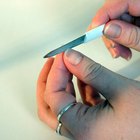
How to Regrow Nails
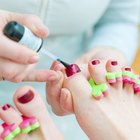
Facts About Nail Polish
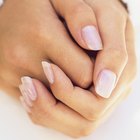
How to Make Nails Look Hard Without ...

Cures for Acetone Damaged Nails
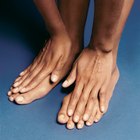
How to Make Nails Thicker
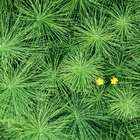
Horsetail vs. BioSil
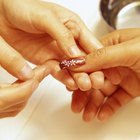
How to Get Acrylic Off of Cuticles

How to Soak Acrylic Nails off in Nail ...

How to Get Acrylic Nails Off at Home ...
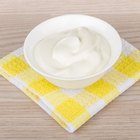
What Are the Ingredients in Yoplait ...
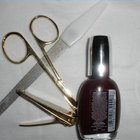
How Does Nail Polish Protect ...

How to Clean Your Fingernails for Men
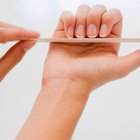
How to Make Your Nails Hard

What Are the Benefits of BioSil?
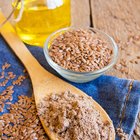
Flaxseeds for Hair & Nail Growth
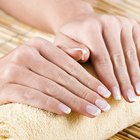
What Is SolarOil?
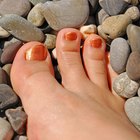
Crumbling Nail Tips
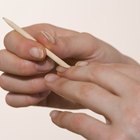
Vaseline on Dry Cuticles

What Foods Provide Calcium D-Glucarate?

How to Treat Dry Nails
References
Resources
Writer Bio
Lisa Sefcik has been writing professionally since 1987. Her subject matter includes pet care, travel, consumer reviews, classical music and entertainment. She's worked as a policy analyst, news reporter and freelance writer/columnist for Cox Publications and numerous national print publications. Sefcik holds a paralegal certification as well as degrees in journalism and piano performance from the University of Texas at Austin.
Photo Credits
jelly image by Christopher Hall from Fotolia.com